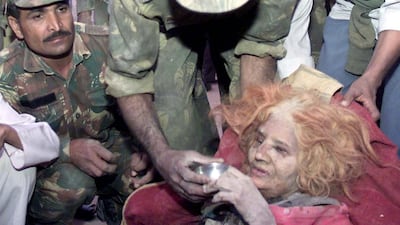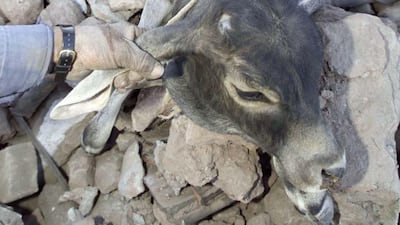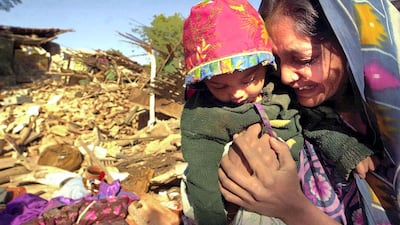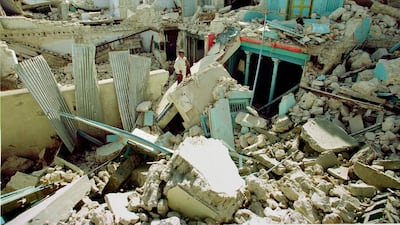On the cold morning of January 26, 2001, Rajesh Bhatt and his 11-year-old daughter, Prarthana, were asleep at their ancestral home in Bhuj, a town in India's western province of Gujarat. What he witnessed that day would become his worst nightmare.
Indians were preparing to celebrate the country's 52nd Republic Day – a national holiday that traditionally brings families together to watch the grand military parade in the capital New Delhi on television.
Mr Bhatt had also planned to watch the fighter jets fly past and tanks roll down Delhi’s main boulevard, over tea and flatbreads prepared by his wife, Gayatri.
But as the clock struck 8.46am, a 6.9 magnitude tremor devastated the town and altered his life forever.
He compared the impact to pieces colliding in a popular Indian tabletop game.
"My bed felt like a striker on a carrom board. It was shaking, moving from one place to another," Mr Bhatt told The National.
“At that moment I thought it was a bomb blast, until I realised it was an earthquake.
"I told my daughter that this was our end.”
Mr Bhatt grabbed his daughter and jumped from from the second-floor balcony of the collapsing house.
Within moments, Bhuj, a town of about 140,000 residents, was reduced to rubble.
The earthquake killed at least 25,000 people, and 150,000 were injured. Bhuj was at the epicentre and particularly badly affected.
It shook an area within a radius of 400 kilometres and affected some 16 million people.
For days, the air was filled with dust, reducing visibility to less than a kilometre. For weeks, survivors searched for their loved ones for weeks under the rubble, as smoke from hundreds of pyres billowed from every corner of the town.
Traumatised survivors slept for weeks under tarpaulin tents in open ground, without electricity or access to clean water, telecommunications, hospitals, rail or road transport.
In the following months, families lived in relief camps, before slowly rebuilding their lives and their town.
Mr Bhatt, now 57, was at the time of the disaster an affluent businessman who lived with his father, his wife Gayatri and their daughter Prarthana and his two brothers and their families in the three-storey ancestral home.
After his miraculous escape, Mr Bhatt saw his house collapse in a cloud of dust, trapping his wife, father and brothers' families under the debris.
His father, now 82, and other family members were rescued from the debris the same night. But Mr Bhatt's wife remained missing.
"I found my father and brother that night, wedged between the collapsed columns, their faces covered with blood. But I didn't find my wife for a week," he said.
After making repeated desperate trips to the debris where his house once stood, Mr Bhatt finally found his wife’s lifeless body.

“She was covered in dust,” he said. “I still cannot stop thinking about her.”
Mr Bhatt remarried three years after the tragedy.
With years of support from NGOs and government grants, the town has regained life. It now boasts earthquake resistant high-rise apartments, advanced hospitals, spacious supermarkets, industries and businesses. But the memories of the earthquake still haunt its inhabitants.
For photographer Paresh Kapta, now 57, it began as an ordinary day on a housewarming ceremony assignment. But while he took pictures on a hill overlooking Bhuj, he saw the town collapse before his eyes.

"I was taking pictures outside, when the earth moved up and down – like a slithering python. When I turned back and looked at the city, there was only dust touching the sky, no sight of houses, only dust," said Mr Kapta.
He managed to capture a 30-second video of the collapsing town and then for the next twelve hours documented the devastation as he rummaged through the rubble, at times on his two-wheeler, at other times treading carefully on the debris so as to not trample on any survivors.
“Nothing was visible … it was dust everywhere. There was only debris as far as my eyes could see … broken, collapsed houses. One couldn’t know whether they were walking over a body. People were screaming, kids were crying. It was harrowing,” he said.
“Every time there is an earthquake in any part of the world, I stay awake all night. I can’t stop thinking about their pain.
"The memory of that day still haunts me.”















